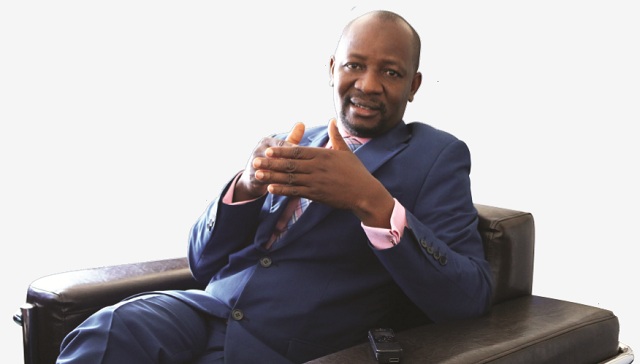
Ibrahim Ssemujju Nganda’s dream was to become a lawyer but he failed to make the cut at A-level. He was instead admitted to study journalism at Makerere University – which he did not like and opted to study a BA Education. But this plan too failed.
“I made attempts to leave journalism for education at least but Dr Abbas Kiyimba pushed me to stay. I would otherwise be a teacher or headmaster by now,” he says.
Ssemujju says he was born on September 23, 1973 and has had to fend for himself because he is from a modest family where resources were shared amongst 46 children of Hajji Ali Nganda Nkwanga of Bijaaba village in present day Kyazanga district. His mother, Sofia Nalwoga, had 16 offspring. Ssemujju says he always went to bed late because he had to wait for his mother to finish her house chores and give him her gomesi (wrapper) to cover.
Going through school was a hustle and his father being a community leader who also supplied food stuffs to some secondary schools, used such contacts to negotiate whenever school fees delayed. He went to Bijaaba Islamic school, Masaka SS where he sat ‘O’ and ‘A’ levels before joining Makerere University.
While studying at Makerere, Semujju got a teaching job and was also writing for The Crusader; a tri-weekly newspaper started and run by majority of his lecturers, and The Monitor. Eventually he became a Monitor reporter after getting his University degree in 1998.
At Makerere, one of his neighbours in Mitchell hall; Haruna Kazibwe had a younger visiting sister whom Ssemujju liked at first sight. The two later met and talked through Kazibwe and from then, it was just a matter of time – mainly waiting for the 16-year old Faridah Babirye to turn 18 years when Ssemujju married her in June 2000. She was then joining Makerere University to pursue bachelors in Education.
Ssemujju says, “During the three years at university, she gave birth to three children but never failed a paper.” They currently have five children.
Eventually around 2003 to 2004 when, as Semujju puts it, President Yoweri Museveni changed the constitution to remove term limits, Semujju did more than journalismwhen he was placed in charge of a project meant to publish articles that highlight dangers of removing term limits.
“I published many articles that led me into activism”.
Semujju says being journalist does not detach one from society but allows him or her make informed decisions and judgment as a member of society.
“When things go wrong, you can’t still claim to be a neutral arbiter because where all political parties and institutions are weak, the media more or less becomes the main opposition to push the government to account for its actions,” says Ssemujju.
He left Monitor to join the team starting The Observer in 2004 from where he crossed into active politics.
He talks of joining parliament as a decision influenced by a journalism political career in parliament and the conflict between Buganda and Museveni around 2009 which made it impossible for him to pretend to be a journalist.
“I went out of my way and was no longer speaking as a journalist but as an activist,” he says, “So I thought it would fair to my colleagues at The Observer and the entire journalism fraternity to exit journalism in March 2010.”
In 2011, Ssemujju offered himself to replace the late Sam Kalega Njuba who was retiring as MP of Kyadondo South. Luck too was on his side as the FDC and Njuba zeroed on him.
Njuba had won elections by only 23 votes and Ssemujju pushed to do better. He says, “I went through tough party primaries but eventually won the MP seat by 15,000 votes and in 2016 my margin grew by 100%”.
 The Independent Uganda: You get the Truth we Pay the Price
The Independent Uganda: You get the Truth we Pay the Price



